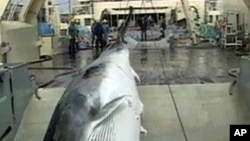Thursday is the 40th anniversary of Earth Day, and environmentalists are using this year's observation to call for tougher measures to protect whales. The 88-nation International Whaling Commission (IWC), is set to rule soon on proposals to partially lift the current ban on while hunting.
Off the Caribbean island of Dominica, school children are thrilled to see whales up close.
These kids are among the more than 10 million people who take whale watching trips every year. Environmentalists promote whale watching and whale research as alternatives to killing whales for commercial purposes.
Despite a 24-year-old worldwide ban on commercial whaling, fishing boats from Japan, Norway and Iceland continue to hunt whales under so called scientific programs that allow whaling and whale meat to be sold at local markets. Critics say these nations use loopholes in the moratorium to kill thousands of the giant marine mammals. Whaling nations argue that whale hunting is a part of their culture and should be allowed.
"Well, over hunting [of whales] is not good, of course, but at the same time it is not good that we cannot eat whale meat at all," said a Japanese. "So, I hope there is a way to negotiate the need of both somehow."
The whaling nations want changes to the 1986 ban in order to allow them to hunt whales for any purpose over the next 10 years, but in reduced numbers. In exchange, they would agree to stricter international monitoring of whaling ships and whale products.
The 88-nation International Whaling Commission (IWC) is scheduled to meet in June in Morocco to consider changes to the moratorium. Japanese officials want the commission to discuss ways of managing whaling rather than banning it.
"At this moment the IWC [International Whaling Commission] does not function as a resource management organization. That means we do not have an appropriate forum to discuss the management of whale resources. We should have it as soon as possible," said Hideki Moronuki of the Japanese Fisheries Agency.
"Whaling is an out moded industry with no real future in the 21st century," said Patrick Ramage, of the International Fund for Animal Welfare. "And for that reason this compromise effort would kind of throw a lifeline to a dying industry."
Patrick Ramage is with the International Fund for Animal Welfare (IFAW). The group strongly opposes granting rights for some countries to kill whales.
"Unfortunately, this new compromise arrangement would end scientific whaling which is to say it would rename it," he said. "It would call it just whaling and Japan would be permitted to continue its activities in a sanctuary off its coast and in the North Pacific Ocean. It is the wrong direction to move in 2010. "
Research groups say hundreds of thousands of whales have been saved since unlimited whaling was banned in 1986. But in recent years the number of whales killed annually has been rising steadily, to nearly 1,700 last year from 300 in 1990. In Iceland, whale hunting resumed seven years ago as part of an arrangement that gives the country an annual quota. Whaler Kristjan Loftsson believes the marine mammals are a renewable source and should be harvested.
"Whaling has been a good business," he said. "We wouldn't be in it if it was a losing industry, I can guarantee that. On a sustainable basis that's the main key element you know. You would never get us to catch the last whale."
Environmentalists say if the IWC lifts the current ban on whaling that will reverse the progress that's been made to grow whale populations, and make it even more difficult to protect whales for future generations.





